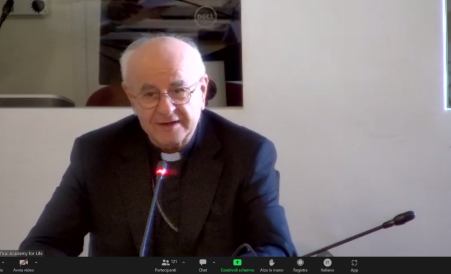Introductory Greeting from Archbishop Vincenzo Paglia
I would like to greet and welcome you all, who are present and connected through Zoom to participate in this webinar entitled "Perinatal Palliative Care. Foundation & Experiences", promoted by the Pontifical Academy for Life. Along with my words of welcome, I would like to extend my gratitude to all the speakers who generously accepted our invitation to contribute to this webinar, in some cases they are connecting from overseas, and therefore with inconvenient times. My heartfelt gratitude therefore goes out to you.
As President of the Pontifical Academy for Life, an institution of the Holy See whose specific mission is to promote initiatives of scientific and cultural nature for the defence and promotion of human life and the dignity of the person at all stages of his or her existence, I feel it is my duty to thank you for your commitment to welcoming these little ones who are marked by the most extreme vulnerability and their families burdened by great suffering. All of you are courageous pioneers and rest assured that you have all the appreciation and support of the Academy in your difficult mission.
For a number of years now, PAV has chosen to pay special attention to the promotion and dissemination of palliative care, as we recognise it a particularly valuable model of accompaniment at the end of a person’s life, both from a scientific, ethical and cultural standview.
Perinatal palliative care expresses the service that prenatal medicine provides to those families who are faced with a diagnosis of a serious pathology in their child. They support the desire of mothers and families to meet their baby at birth and to celebrate its life, albeit briefly, because before death, there is life. And in this context of great love for life, perinatal palliative care is committed to giving comfort to little patients, respecting their dignity as a person, without artificially shortening or prolonging their lives.
The good news is that in a prevailing throw-away culture, there are more and more parents who ask to accompany their seriously ill child to the end. The culture of perinatal palliative care therefore responds to a growing demand in the world. My wish and the wish that I address to all of you is that this model may develop more and more not only as a response of a high scientific and clinical level, but that it may be accompanied by the sympathetic embrace of the families who have already lived the experience of their child's serious illness, and by a spiritual support that, in addition to offering prayerful support, also extends, when necessary, to psychological, logistical and economic support. This approach ensures that when faced with a diagnosis that is difficult to accept, families are helped to process their suffering and to live through this terrible experience in an authentically human way.




